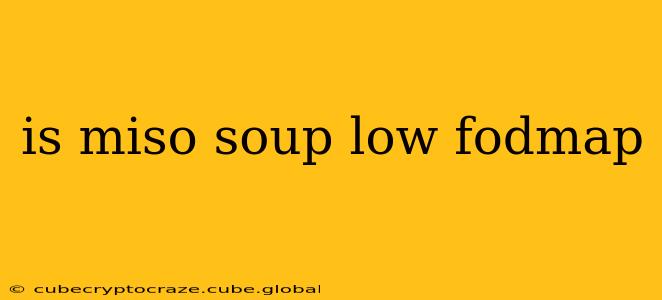Is Miso Soup Low FODMAP? A Comprehensive Guide
Miso soup, a staple in Japanese cuisine, is known for its savory broth and umami flavor. But for those following a low FODMAP diet to manage Irritable Bowel Syndrome (IBS) symptoms, the question of whether it's suitable is crucial. The answer, unfortunately, isn't a simple yes or no. It depends heavily on the ingredients and the serving size.
Understanding FODMAPs: FODMAPs are fermentable oligosaccharides, disaccharides, monosaccharides, and polyols – essentially short-chain carbohydrates that can trigger digestive distress in individuals with IBS. A low FODMAP diet involves temporarily restricting these foods to identify triggers and then gradually reintroducing them to determine individual tolerances.
The Miso Soup Dilemma: The key ingredients in miso soup – miso paste, dashi (broth), and often tofu, seaweed, and vegetables – each have different FODMAP profiles.
What Makes Miso Soup Potentially High FODMAP?
-
Miso Paste: Miso paste itself contains FODMAPs, primarily fructans. The amount varies depending on the type of miso (e.g., white, yellow, red). Generally, smaller servings of miso paste are better tolerated than larger ones. White miso tends to be lower in FODMAPs than darker varieties like red miso.
-
High-FODMAP Vegetables: Many common miso soup additions, like onions, garlic, and leeks are high in FODMAPs and should be avoided on a strict low FODMAP diet. Even seemingly innocuous vegetables like mushrooms and certain types of seaweed can be problematic in larger quantities.
-
Dashi (Broth): While traditional dashi made with kombu (kelp) and bonito flakes (skipjack tuna) is generally low in FODMAPs, some commercial dashi broths may contain high-FODMAP ingredients. Always check the label.
Is Miso Soup Ever Low FODMAP?
Yes, miso soup can be low FODMAP, provided you carefully consider the ingredients and portion sizes.
Creating a Low FODMAP Miso Soup:
-
Choose White Miso: Opt for white or light-colored miso paste, as these tend to have lower levels of fructans.
-
Limit Miso Paste Quantity: Use a small amount of miso paste (approximately 1-2 tablespoons). Start with the smaller amount and see how your body reacts.
-
Select Low FODMAP Vegetables: If you add vegetables, stick to low FODMAP options in small portions, like a small amount of spinach, carrots, or bok choy. Always check the Monash University FODMAP app for guidance on specific vegetables and serving sizes.
-
Use Low FODMAP Dashi: Ensure you are using a dashi broth that is free of high FODMAP ingredients. Many commercially available low FODMAP broths are available. Homemade dashi with kombu and low FODMAP mushrooms is an excellent choice.
-
Avoid High FODMAP Additions: Strictly avoid onions, garlic, leeks, and other high FODMAP vegetables and seasonings.
How Much Miso Soup Can I Have on a Low FODMAP Diet?
There's no one-size-fits-all answer. Individual tolerances vary greatly. Begin with a very small serving (e.g., a small bowl) of carefully made low FODMAP miso soup and monitor your symptoms. If you tolerate it well, you can gradually increase the portion size, but always remain vigilant and listen to your body.
What Are Some Low FODMAP Alternatives to Miso Soup?
If miso soup consistently triggers your symptoms, even in small portions, consider low FODMAP alternatives like:
- Chicken or Vegetable Broth (low FODMAP): A simple broth-based soup with low FODMAP vegetables like carrots, zucchini, and spinach.
- Clear vegetable broth with herbs and spices: A light and flavorful soup that's easy on the digestive system.
Can I Use Pre-Made Miso Soup?
Many pre-made miso soups contain high FODMAP ingredients. Always check the label carefully and look for brands that specifically state "low FODMAP" on their packaging. Even if a product seems suitable, start with a small portion to test your tolerance.
Ultimately, whether or not miso soup is suitable for your low FODMAP diet depends on the specific ingredients, their quantities, and your individual sensitivity. The information here should be used as a guide. Always consult with a registered dietitian or healthcare professional specializing in IBS for personalized dietary advice. They can help you create a low FODMAP meal plan that meets your specific needs and tolerance levels.
